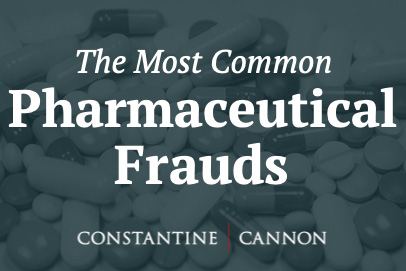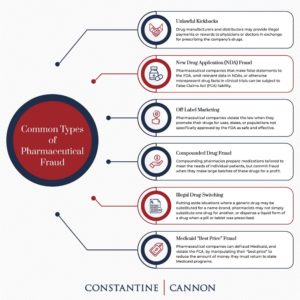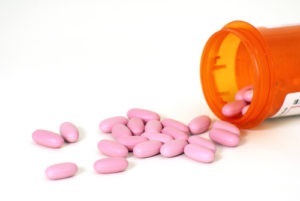Pharmaceutical Fraud
Understanding the most common types of pharmaceutical industry fraud reported by whistleblowers.
The pharmaceutical industry is regularly found to be engaging in fraud of many types, and whistleblowers are uniquely positioned to report this fraud to the government under the False Claims Act.

Common Fraud in the Pharmaceutical Industry Includes:
- Unlawful Kickbacks
- Compounded drug fraud
- Illegal drug-switching
- Misuse of the 340B drug discount program
- Medicaid best price fraud
- Medicare Part D Fraud
- Fraud by Pharmacy Benefit Managers (PBMs)
- Clinical trials manipulation/fraud against the Food and Drug Administration (FDA)
- Off-label marketing/Food Drug and Cosmetic Act (FDCA) violation
- Failure to comply with Current Good Manufacturing Practices (CGMP) requirements
Unlawful Kickbacks
It’s no secret the pharmaceutical industry influences doctors’ prescribing habits. Drug manufacturers and distributors may pay unlawful kickbacks to physicians or others in the form of sham “consulting fees,” luxury vacations, and expensive meals, in exchange for increased prescriptions of the company’s drugs.
Clinical trials manipulation/fraud against the Food and Drug Administration (FDA)
Drug manufacturers must obtain FDA approval before marketing a new drug. The FDA approves new drugs proven safe, effective, and properly labeled following extensive preclinical and clinical testing and analysis, which results in a wealth of data regarding the drug’s safety, efficacy, pharmacology and toxicology. The FDA relies on the accuracy of the data that drug manufacturers submit in New Drug Applications (NDAs). Pharmaceutical companies that make false statements to the FDA, omit relevant data in NDAs, or otherwise misrepresent the safety or efficacy of drugs in clinical trials can be subject to False Claims Act (FCA) liability. The same is true of drug companies who pay researchers to falsify clinical trial data.
Off-label marketing/Food Drug and Cosmetic Act (FDCA) violation
Pharmaceutical companies may not promote their drugs for uses, doses, or populations not specifically approved by the FDA as safe and effective. Such “off-label” marketing and promotion violates the FCA. This could include, for example, if a drug is approved for use in treating severe psychiatric disorders, and the drug company’s sales representatives promote it for widespread use in calming elderly patients in nursing homes.
Failure to comply with Current Good Manufacturing Practices (CGMP) requirements
Drug and medical device manufacturers are subject to strict FDA manufacturing rules known as the Current Good Manufacturing Practice (CGMP) regulations.
The CGMP exist to ensure the identity, strength, quality, and purity of manufactured drugs, and to protect consumers from tainted, ineffective, and harmful drugs. Government-funded healthcare programs pay for prescription drugs on the premise that the drugs have been manufactured in accordance with CGMP regulations. If they are not, it can be a violation of the False Claims Act.
This could include, for example, a pharmaceutical company’s manufacturing facility using dirty equipment to make drugs, or using equipment that does not accurately measure the type or amount of the active ingredients incorporated into a drug, and then selling these tainted drugs to patients covered by Government-funded health care programs.
Compounded drug fraud
Compounding pharmacies prepare medications tailored to meet the needs of individual patients by mixing drugs or changing the route of administration. Compounding pharmacies can violate the FCA by making large batches of drugs—known as mass-compounding—rather than providing the required individualized service, “compounding” drugs that are already commercially available, or inflating the amount of particular medications used in the mixture to increase the cost. Compounded drugs are primarily regulated by the states, meaning efficacy and safety need not be proven to the FDA.
Illegal drug-switching
As a general rule, pharmacies must fill patients’ prescriptions as they are written by the ordering physician. Putting aside situations where a generic drug may be substituted for a name-brand drug, pharmacists may not simply substitute one drug for another, or dispense a liquid form of a drug when a pill or tablet was prescribed. Billing government insurers for medications that have been so manipulated can be a violation of the False Claims Act.
Misuse of the 340B drug discount program
The federally mandated 340B drug discount program requires most drug companies to provide hefty discounts — typically 20 to 50 percent — to hospitals and clinics that treat low-income and uninsured patients. Pharmaceutical companies are required to cap outpatient drug prices at a statutorily defined “ceiling price” equal to the Average Manufacturer Price (AMP) reduced by the rebate percentage, or Unit Rebate Amount (URA). Manufacturers submit both the AMP and URA to the Centers for Medicare and Medicaid Services (CMS) on a quarterly basis, and can defraud the government by misrepresenting these figures, overcharging 340B entities, and/or not providing rebates to which 340B entities are entitled.
Medicaid best price fraud
To obtain Medicaid coverage of their drugs, pharmaceutical companies generally must promise to give state Medicaid programs the lowest price made available to almost any buyer of the drug. To provide this price, pharmaceutical companies report their “best price” on a drug—often calculated based on the drug’s “average wholesale price” or “average manufacturer price”—and pay back to Medicaid in rebates any amount the programs paid in excess of this price. Pharmaceutical companies can defraud Medicaid, and violate the False Claims Act, by manipulating their “best price” to reduce the amount of money they must return to state Medicaid programs.
Medicare Part D Fraud
Implemented in 2006, Medicare Part D, also referred to as the Medicare Prescription Drug Program, provides drug coverage for tens of millions of elderly and disabled Americans. Under the program, private insurance companies—referred to as Part D Sponsors—provide prescription drugs to eligible beneficiaries either directly or through pharmacy benefit managers (so-called “PBMs”), and then submit claims to Medicare for the drugs’ cost. Fraud can occur under Medicare Part D in many ways, including:
Some of the more common types of fraud occurring under the Medicare Part D program include:
- Billing for drugs not actually provided.
- Billing for drugs not covered by Medicare.
- Billing for brand name drugs when generic drugs are provided instead.
- Billing for drugs—especially opioids and other controlled substances—diverted for illegitimate purposes.
- Billing for expired drugs.
- Billing for drugs dispensed without a prescription, or with a falsified prescription.
- Billing for drugs dispensed with prescriptions from unauthorized, excluded, or non-existent healthcare providers.
- Billing for drugs provided in quantities that exceed approved limits.
Fraud by Pharmacy Benefit Managers (PBMs)
PBMs are an increasingly common target of fraud investigations. PBMs are third party administrators of prescription drug programs for, among others, Medicare Part D plans. PBMs contract with health plans to provide pharmaceuticals at low prices, which PBMs keep low through negotiation, generic substitution, manufacturer rebates, cost-sharing, formularies, and other methods. PBMs commit fraud by failing to pass savings from rebate arrangements and subsidies to clients, developing formularies that favor more expensive drugs, and improperly switching drugs to either a generic or different brand name drugs instead of the drug prescribed. Drug manufacturers commit fraud by, for example, providing price concessions on certain drugs in exchange for a PBM’s favorable coverage of the manufacturer’s drug.
Considering reporting pharmaceutical fraud? Get your questions answered:





